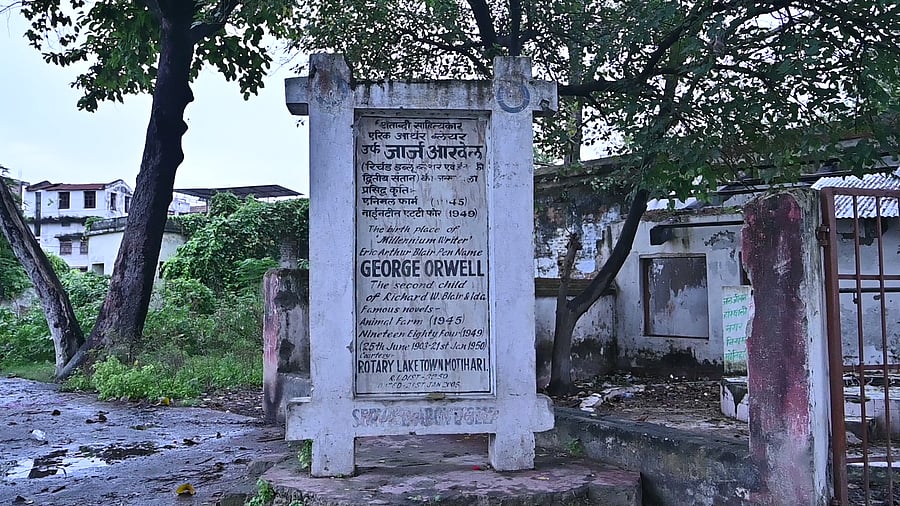
George Orwell’s birthplace.
Credit: DH photo
Motihari: The small colonial era staff bungalow in the town of Motihari where the much celebrated English author George Orwell was born more than a century ago is gradually slipping into ruin, rather it has already. Any visitor who goes there finds peeling walls, broken gates, and a grim reminder of official neglect.
For years, locals and literary enthusiasts had hoped this humble structure in Motihari’s eastern outskirts would become a proud museum. But as Orwell wrote in Animal Farm, 'All animals are equal, but some animals are more equal than others,' In Motihari, this echoes a bit differently but in a similar tone - for among India’s heritage sites also, some are clearly more equal than others.
You can't miss the haunting irony right at the entrance of the site where even the board that declares it to be a 'protected site' lies cracked, torn and faded, barely legible to passersby. The man who wrote “The past was erased, the erasure was forgotten, the lie became the truth” in 1984 would have found grim resonance in the state of his own birthplace today.
Eric Arthur Blair, known to the world as George Orwell and the author of 1984 and Animal Farm, was born here on 25 June, 1903 when his father worked with the British opium department. In 2014, Bihar's Art and Culture Department said that the bungalow will be restored and a museum will be designed with the help of experts. By 2021-22, some files must have moved and it looked like the department was very much keen to keep its words.
Some repair work and restoration efforts were made and that gave locals some renewed optimism. But, things look really bad now as the structure is again feeling the heat neglect with no real efforts in securing or restoring it. A resident of Motihari, Jitendra Kumar Sharma told DH that 'despite this being a historical site, the government does not do anything to save it.' Sharma further said, 'government officials come, they click pictures and do nothing about it. Locals have given many petitions to the government representatives but no one seems to be interested in doing anything about it.'
The entrance also does not have any signboard suggesting the place's relevance. It's only when you reach the backyard of the compound, you will find a bust of George Orwell with a 6-ft-tall stone inscription. Apart from these, there are rooms which you will enter at your own risk as anything might fall on your head or you might encounter a snake, and there is a well.
Talking about the 2014 restoration plan, a tea-seller in the vicinity says, 'there was so much excitement when they made the announcement, but soon we tasted the reality. 'It's not the case that the place does not have visitors. Everyday, I see people coming here, occasionally foreigners too but only the local administration does not know the importance I think.' For a man who wrote about truth and corruption, this is a sad truth.”
It's even more surprising to see that there is no permanent guard positioned there and in the evening one man on cycle arrived and asked us to leave as he has to lock the gates. We tried to speak to him about the place and who has put him in-charge for opening and locking the gates everyday but he refused to speak.
After enquiring further in the vicinity we found that earlier there used to be a permanent caretaker but since the last couple of years no one has been given that duty. In the absence of a permanent caretaker, anyone can enter the compound, throw garbage or even bring their cattle to graze.
'Every generation imagines itself to be more intelligent than the one that went before it,' Orwell wrote in Animal Farm, 'and wiser than the one that comes after it.' Standing in Motihari today, one can’t help but feel the line applies not just to politics, but to preservation.
In the ongoing noise of political campaigning for Bihar Elections 2025, this dilapidated structure is barely standing in the hope that someday, someone will hear its silence.